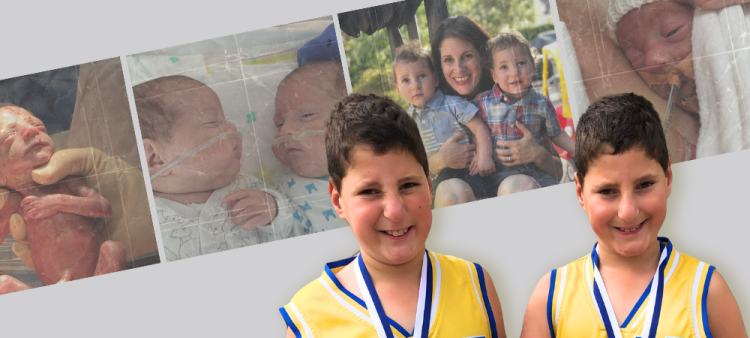
Born very prematurely at 25 weeks’ gestation, identical twins Joshua and Noah had to fight to survive. While in their mother’s womb, the boys had developed a rare and potentially fatal condition.
For Multiple Birth Awareness Week, their mother Loni shares what a difficult start to life the twins experienced.
Already a mother of two daughters, Loni knew early on that her pregnancy with the twins was different.
“I could hardly walk before they were delivered. I felt like I had a bowling ball pressing down on me,” Loni says.
She learned that her unborn babies had developed twin-to-twin transfusion syndrome (TTTS). This condition is rare but very serious and only occurs in identical twins while they are in the womb.
With TTTS, there's an imbalance in the blood flow between the twins through the shared placenta. This means that one of the twins hardly receives any blood from the placenta while the other receives the majority.
This condition can lead to various complications for both twins. In some cases, it can be treated by laser therapy to restore a more balanced blood flow. Sadly, this was not an option for Loni, and the boys had to be delivered extremely early.
“It was the most harrowing, stressful and daunting experience,” Loni shares. “For the first 72 hours, we didn’t know if they would survive.”
Loni and her husband had lost a baby daughter two years before. The sudden and unexpected birth of the twins re-traumatised them. “We were terrified of losing another child,” Loni says.
The next few weeks and months were a rollercoaster of emotions for the family. Especially as Noah, the twin who received too much blood in utero, was extremely unwell when he was born.
“Noah’s lungs were extremely under-developed and just weren't responding to the treatment,” Loni says. “It took a lot to get him to a stable place.”
The twins stayed five months in the Women’s Neonatal Intensive Care Unit (NICU). Loni says the care and support she’s received from both the Women’s staff and fellow NICU parents made all the difference.
And it motivated her to give back, by participating in research trials while her twins were in NICU.
“We were so grateful for the care we received. I was so interested in how they managed to keep our children alive that I just wanted to give back.
“It's just the most meaningful work I could do,” Loni says.
Fast forward to today, Joshua and Noah will celebrate their eighth birthdays in April. Loni describes them as big solid boys who love playing footy and basketball – and games on their favourite console.
“They are very close,” Loni says. “Their relationship is first and everything else is second. They very much look after each other.”